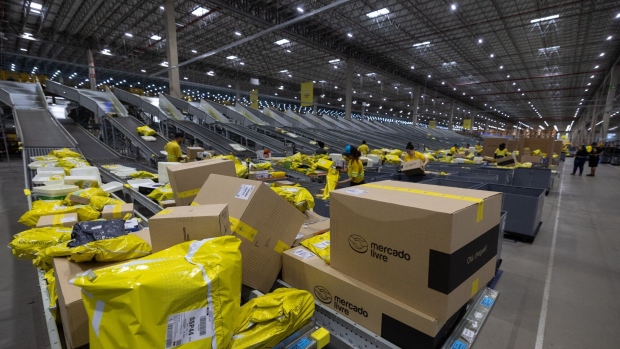May 2, 2024
MercadoLibre Weathers Argentina Tumult With Mexico, Brazil Gains
, Bloomberg News

(Bloomberg) -- Latin American e-commerce and fintech giant MercadoLibre Inc. jumped the most since August after posting strong first quarter earnings that saw profit surge in Brazil and Mexico, helping offset the hit from Argentina’s currency devaluation.
Net income for the three-month period ended March totaled $344 million, a 71% increase from a year earlier. That compares to the $313 million average forecast by analysts tracked by Bloomberg, and also incorporates a negative $10 million impact due to some changes to its reporting method unveiled Thursday. Revenue rose 36% from a year earlier to $4.3 billion.
Shares rose as much as 11% in New York trading Friday, erasing losses for the year.
While the devaluation of the Argentine peso under President Javier Milei “shrank the size” of the firm’s highly profitable local business, the margin compression seen was “more than compensated” by improvements in Brazil and Mexico, according to Chief Financial Officer Martin de los Santos.
There are “some tough headwinds from Argentina,” de los Santos said in an interview. “We’ve seen it in the past, we’ve been through it. The good thing is our marketplace tends to be very resilient to this kind of situation.”
Gross merchandise volume totaled $11.4 billion, also ahead of estimates, while the loan book rose to $4.4 billion amid a pickup in the credit-card business in Brazil and Mexico. MercadoLibre has grown “a lot more confident” in its underwriting capabilities as it gathers more data from customers, he said.
Its nascent advertising business also performed strongly gaining 64% in dollar terms to represent 1.9% of GMV.
Argentina’s results were a negative and that trend is expected to persist in the coming quarters, Banco BTG Pactual SA analysts including Luiz Guanais wrote. Still, the company “maintained its e-commerce outperformance in its main markets versus peers, reinforcing its competitive advantage as an ecosystem.”
Founded in 1999, MercadoLibre is now Latin America’s second-most valuable publicly listed company with a market capitalization of $84 billion. Shares had been down for the year after a selloff following full-year earnings in February when a series of one-off costs were announced.
The company reported 53.5 million unique buyers through its e-commerce arm and 49 million monthly active users for its fintech division. The number of users for its asset management service nearly doubled in the past year with strong growth in Argentina and Mexico, the company said in the release.
Mercado Pago continues to expand its offering and presence in Mexico where rivals are also increasing investments to try to capture customers in Latin America’s second-largest market.
“Our strategy is to be the largest fintech in Mexico,” said Osvaldo Gimenez, the head of the fintech business, in a call with analysts. “Mexico is going through a transformation similar to the one the market underwent in Brazil in the last five to seven to 10 years,” with an increase in financial inclusion and credit. “We have a big opportunity to be leaders in this market.”
Last month, MercadoLibre announced plans to add 18,000 jobs this year — with the bulk in Mexico — which would leave its workforce at about 76,000 people by year-end. Investments in its biggest market of Brazil will grow 21% this year to 23 billion reais ($4.5 billion).
The Montevideo, Uruguay-based company announced updates to the way it reports some lines including the exclusion of peer-to-peer transfers from its total payment volume, which led to a lower total number of $40.7 billion for the first quarter.
It also reclassified its fintech division Mercado Pago’s interest income and altered the way it books some expenses in its logistics arm Mercado Envios — which ended up having a positive impact on net revenue.
“Fintech remains a bright spot and growth in monthly active users may stay strong in 2Q,” Bloomberg Intelligence analysts Jennifer Bartashus and Jibril Lawal wrote in a note. “Margins are likely to remain pressured in 2Q on Argentina weakness.”
(Updates share price and adds analyst comments throughout.)
©2024 Bloomberg L.P.





